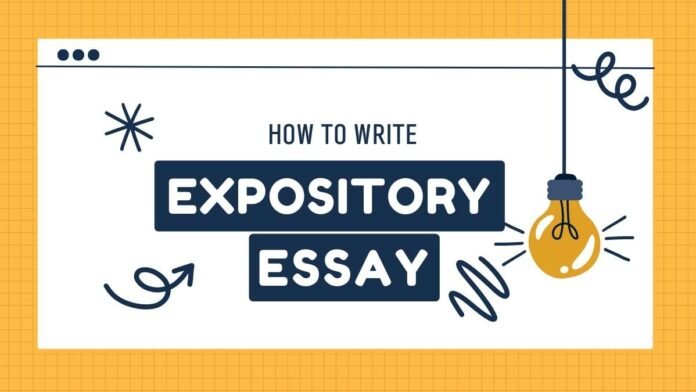An expository essay is a common type of essay assignment in school and college. It is also used in many professions, such as journalism, business, and law.
TABLE OF CONTENT
- What is an Expository Essay?
- The Structure of an Expository Essay
- Example of an Expository Essay
- Tips For Writing An Expository Essay
What is an Expository Essay?
If you’re wondering what an expository essay is, it’s a piece of writing that explains a specific topic clearly and straightforwardly. Unlike persuasive or argumentative essays, it doesn’t try to convince you of anything or take a particular stance. The goal is to provide information, ideas, and concepts in a way that’s easy to understand. When writing an expository essay, it’s essential to be objective, clear, and precise. You can effectively communicate even the most complex ideas and concepts.
The Structure of an Expository Essay
The basic structure of an expository essay is:
- Introduction: This paragraph introduces the topic of the essay and provides some background information. It includes a clear thesis statement that outlines the essay’s main idea.
- Body paragraphs: These paragraphs develop the thesis statement by providing evidence and explaining the topic in more detail. Each section should start with a topic sentence that introduces the paragraph’s main point. Evidence, examples, and explanations are used to support the topic sentence.
- Conclusion: This paragraph summarizes the essay’s main points and restates the thesis statement. It may also offer insights, implications, or broader context related to the topic.
Introduction
….. (x) …. is one of the most popular ….. in our world. ….. (use general words to describe it) …… In the coming lines I will discuss the pros and cons of ….. (x) ….
Body Paragraph 1: Benefits of Smartphones
One of the most enormous benefits of ….. (x) …. is ……. (1st advantage) ……... …. (Give further details or examples) ….. ….. (x) …. also has …….. (2nd advantage) ……... …. (Give further details or examples) ….
Furthermore, ….. (x) …. is/are excellent for (3rd advantage) ……... …. (Give further details or examples) ….
Body Paragraph 2: Drawbacks of Smartphones
While ….. (x) …. have many benefits, it/they also have some drawbacks. One of the biggest concerns is that ……. (1stdisadvantage) ……... …. (Give further details or examples) …. Additionally, …….. (2nd disadvantage) ……... …. (Give further details or examples) …. Finally, (3rd advantage) ……... …. (Give further details or examples) ….
Example of an Expository Essay
Introduction
Smartphones are one of the most popular technologies in the world. People use them for various tasks, including communication, entertainment, and productivity. In the coming lines I will discuss the pros and cons of smartphones.
Body Paragraph 1: Benefits of Smartphones
One of the most enormous benefits of smartphones is their portability. It’s so great that you can keep in touch with your loved ones no matter where you go. Smartphones also have various features that can make your life easier. These include calculators, calendars, and maps. Furthermore, smartphones are excellent tools for online access to information and resources. They can help you find answers to anything you’re curious about. What’s more, they connect you with people and resources that can make your life easier.
Body Paragraph 2: Drawbacks of Smartphones
While smartphones have many benefits, they also have some drawbacks. One of the biggest concerns is thatsmartphones can be addictive. People can get sucked into smartphone use for hours. This may lead to sleep deprivation and social isolation. Additionally, smartphones can be a distraction. Mainly when people use them in school or work settings. Finally, smartphones can be expensive. Take for example the Iphone prices.
Conclusion
To sum up, smartphones are a powerful tool that can people can use for both good and bad. we must be aware of their disadvantages so that we can responsibly use them.
Tips For Writing An Expository Essay
- Understand the Prompt: Read and understand the essay question carefully. This is to guarantee you address the specific topic and requirements.
- Choose a Clear Thesis: Craft a clear and concise thesis statement that outlines your essay’s main point or purpose.
- Plan Your Structure: Create an outline with an introduction, body paragraphs, and conclusion. This helps organize your ideas logically.
- Topic Sentences: Begin each body paragraph with a strong topic sentence that introduces the paragraph’s main idea.
- Provide Evidence: Support your points with factual evidence, examples, statistics, or anecdotes. This adds credibility to your essay.
- Stay Objective: Maintain an objective tone throughout the essay. Avoid expressing personal opinions or emotions.
- Logical Flow: Ensure a smooth transition between paragraphs and ideas. Use linking words and phrases to guide the reader.
- Clarity and Conciseness: Write clearly and concisely. Avoid overly complex sentences and jargon that might confuse the reader.
- Revise and Edit: Proofread your essay for grammar, spelling, and punctuation errors. Make sure your ideas are presented logically.
- Finalize with a Strong Conclusion: Summarize your main points in the conclusion and restate the thesis. Provide a thought-provoking closing statement.





[…] Click on this link to see How to Write an Expository Essay 2023 Guide […]